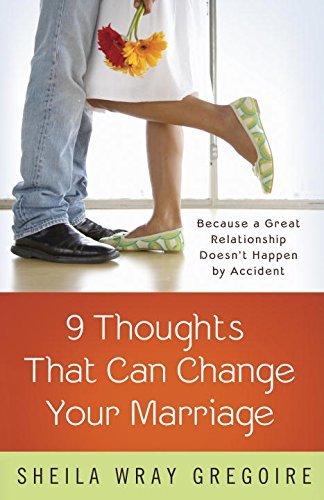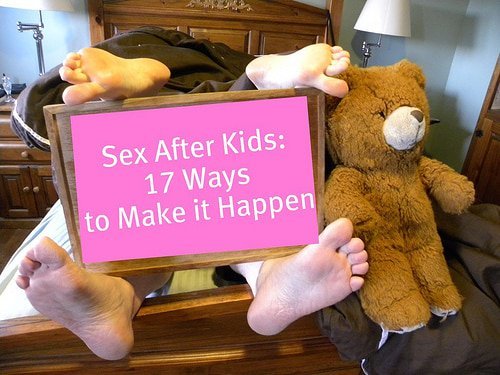Sheila Wray Gregoire's Blog, page 82
May 30, 2019
PODCAST: A Horrible Score Card for Wives
What would happen if you went to marriage counseling, and you were handed a list of 100 sins you may be committing against your husband?
It’s time for a new To Love, Honor and Vacuum podcast! And this one is a little bit different. Something was brought to our attention that was just so awful that we thought it was worth devoting an entire show to. So Rebecca, Connor and I all jumped on the microphone and dissected this list.
Listen in here:
On Twitter, someone shared a list of “homework” that they had received from Harvest Bible Chapel back in 2011/2012.
It was pretty awful. And all day on Tuesday my Twitter feed was blowing up as people shared very similar homework that they had received from other churches. We managed to track the root of it–a guy named Wayne Mack wrote a book back in 1980 of homework for Marriage and Family Counseling. And people had adapted his lists. It looks like churches were getting them from several biblical counseling organizations–Faith Bible Counseling in Lafayette, or the Biblical Counseling Organization.
(Seriously, this is one of the reasons I was concerned with biblical counseling).
So you go in for marriage counseling, and you’re handed a list of 98 things you may be doing to sin against your husband (another list from another church had 102). And there don’t seem to be equivalent lists for men. There are lists with 100 ways men can show love to their wives (and equivalent lists for women), but not lists that accuse men of sinning in all of these ways.
We’re dissecting this list on the podcast, and talking about how this whole approach is so harmful to marriages (and to women). I’ve uploaded two versions of the lists to the site, and you can download them here if you’d like. The first one has three components to it: How to love your husband; a scorecard for wives (where husbands can rate you on various aspects); and a list of 98 common ways wives sin against their husbands. The second is just the latter list, updated.
Scorecard for Wives & Common Ways Wives Sin (HBC)
Three documents are included here, that were shared on Twitter. It comes from Faith Bible Counseling, and was handed out at Harvest Bible Chapel in Chicago in 2011/2012.
LOG List Wife & Mother
An updated list put out by the Biblical Counseling Center with over 100 ways a wife may be sinning.
I would really prefer not to talk about all of this stuff, but then something big breaks on Twitter and people ask me to, and so I do. But we’re working on the Honeymoon Course we’ll be releasing June 10, and that seriously is much more fun! So I’ll be talking about that in the next few weeks.
However, I am burdened by how badly women are treated in some churches, and how much marriages are hurting. So I want to draw attention to this and let you know up front: this is not okay. One day some of you may be really vulnerable, at the lowest point of your life, and you may turn to your church for help.
I want you to know now: If they give you a list like this, this isn’t safe. And it’s okay to say no.
(I’ll be writing a bigger post about this on Tuesday, but I wanted to comment on it today.)
And remember, women: God wants you ultimately serving Him. He is to be your focus–not your husband! When we love God appropriately, THEN we’ll be able to see clearly to love our husbands well, too.
If you’re struggling with all of this, please pick up 9 Thoughts That Can Change Your Marriage, which helps you look at marriage differently, with a Christ-centred, rather than a husband-centred, approach. And that actually allows us to love our husbands much more effectively and much more freely!
Do you have a hard time asking for what you want?

You can change the dynamic in your marriage and make talking about your own needs easier!
If your marriage is in a communication rut, it’s time for some change.
Take me to it!
What would you think if you were ever given this list? What stands out to you in it? Let’s talk in the comments!
Like this post? You may also like:

What Does It Mean to Obey Like Sarah?

Author
Social Media
Sheila's Best Posts
Books
Courses
Freebie
 Sheila Wray Gregoire has been married for 27 years and happily married for 22! She loves traveling around North America with her hubby in their RV, giving her signature "Girl Talk" about sex and marriage. And she's written 8 books. About sex and marriage. See a theme here? Plus she knits. Even in line at the grocery store.
Sheila Wray Gregoire has been married for 27 years and happily married for 22! She loves traveling around North America with her hubby in their RV, giving her signature "Girl Talk" about sex and marriage. And she's written 8 books. About sex and marriage. See a theme here? Plus she knits. Even in line at the grocery store.
 Find Sheila Here:
Find Sheila Here:
Facebook
Twitter
Instagram
YouTube
Pinterest
Sheila's Favorite Posts on To Love, Honor and Vacuum:
10 ways to initiate sex
10 Effects of Porn on Your Brain, Marriage, & Sex Life
Why So Much Marriage Advice is So Trite
How can Sex be Hot and Holy at the Same Time?
Check out some of Sheila's Books:
The Good Girl's Guide to Great Sex
31 Days to Great Sex
9 Thoughts That Can Change Your Marriage
To Love, Honor, and Vacuum
Check out Sheila's Courses:
The Boost Your Libido Course
The Whole Story: Talking to Your Daughter about Sex, Puberty, and Growing Up
The FREE Emotional Intimacy E-Course
Are you ready to take your marriage to the next level?
Sign up for our emails and get access to the TLHV free marriage and parenting resource library. We have over 25 downloads and are constantly adding more. Sign up here!

 Marriage isn't supposed to be blah!
Marriage isn't supposed to be blah!
Sex is supposed to be stupendous--physically, emotionally, AND spiritually. If it's not, get The Good Girl's Guide to Great Sex--and find out what you've been missing.

May 29, 2019
Terms About Sex Adults Should Know
Many of us jump into marriage never knowing terms for various aspects of sex.
Even if we understand the basics of “the deed,” proper words and terms aren’t always taught.
This month, during Wednesday posts, I’ve been talking about sex ed for Christians. I really believe that, as the church, we need to do a better job teaching people about sex. Part of that is because, if we really believe sex is for marriage, we need to set couples up for success, instead of shaming them and causing libido issues. Another big reason is so that, if something seems off, people realize it and seek help.
Over the course of this month, I’ve covered the theology of the clitoris, the theology of the penis, and a (really important!) post about how noticing isn’t lusting. This Wednesday we’re finishing up the series with a list of terms about sex adults should know.
A big part of education is learning words for things. It’s actually been shown by many studies that teaching kids the correct terminology for their genitalia from long term abuse. It’s important that we know what we’re talking about so that we can have open dialogue with our spouses. There was a hilarious dust-up on Twitter a while ago when a guy tried to “mansplain” what a vagina was–when really he was talking about the vulva. He wouldn’t back down, even when gynecologists told him he had the terms wrong. But that’s a common thing to not understand! Similarly, did you know that semen and sperm aren’t interchangeable terms? This stuff does matter.
All of this is why I wrote the Good Girl’s Guide to Great Sex. I wanted to put together a resource to answer questions Christians have about sex in a positive way and to help support couples, whether they are preparing for marriage or have already been married, to have the best intimate lives possible.
Do you feel unprepared for sex?

I wrote the Good Girl’s Guide to Great Sex to be a tool to help women learn about and embrace sex without fear. If you’re feeling overwhelmed by the idea of sex, check it out–I wrote it for you!
Check out The Good Girl's Guide to Great Sex!
Last week, I put out a call to my team to suggest terms that adults should know about sex. Here’s the crazy thing – many of us learned a few new vocabulary words in the process! Give a look through our lists to see if there are any that you haven’t heard of.
A Dictionary of Sexual Health Terms Adults Should Know
Female Reproductive Anatomy
Cervical Mucus – Fluid released from the cervix throughout the menstrual cycle to aid sperm motility and increase the chance of conception. Tracking cervical mucus is a part of many natural family planning methodologies.
Female genitalia – Female external genitalia is called the vulva and includes the clitoris, urethra, vagina, labia majora, and labia minora. (Click here for a diagram)
Hymen – a membrane that covers the opening of the vagina, typically in a virgin. It is generally broken at first intercourse, which may or may not hurt. However, some are born without a hymen, and it may be broken at other times, and absence of the hymen does not mean absence of virginity.
Female reproductive system – The female reproductive system consists of the vagina (which ends at the opening of the uterus, or cervix), the uterus, ovaries, and fallopian tubes.
G-Spot – A sensitive area of the vaginal wall, located toward the front of the vagina, which, when stimulated in many women can produce orgasm. Learn how to find your G-spot here!
Pelvic floor – the muscles controlling urination, vaginal function, and defecation. They may be strengthened by doing kegel exercises and/or by the support of a pelvic floor physiotherapist. (A pelvic floor physiotherapist explains when it’s the right time to get help)
Male Reproductive Anatomy

Diagram showing male reproductive system illustration
Male genitalia and reproductive system – Male genitalia consists of the penis, testicles (which contain the testes), and scrotum.
Semen – Reproductive fluid containing sperm which is released upon male orgasm.
Other Posts on Sex Education:

Where to Find Safe Information about Sex

10 Things to Know about Arousal and Women
Sexual Activities
Manual Stimulation – Using one’s hand to rub and/or massage a partner’s genitalia to give them sexual pleasure. Many women achieve orgasm solely through oral or manual stimulation of the clitoris.
Masturbation – Rubbing or stimulating one’s own genitals to achieve sexual pleasure.
Oral Sex – Using one’s mouth on a partner’s genitalia to give them sexual pleasure. When the man is performing oral sex, it is called cunnilingus. When the woman is performing oral sex, it is called fellatio.
Penetrative Sex/Coitus – Sex in which the penis is inserted into the vagina.
Erotica – Books written to arouse readers. Reading erotica is often accompanied by fantasizing about the characters read about or masturbation.
Pornography – Photographs and movie clips including nude and semi-nude scenes and displays of sexual encounters intended to arouse viewers. Viewing porn is almost always accompanied by masturbation.
Components of human sexual function
Arousal – Body changes that make intercourse possible and comfortable. For men, arousal results primarily in an erection of the penis (see below). For women, arousal primarily includes lubrication of the vagina and vulva. More, however, is involved in arousal than just that, and you can see my post on arousal and women for greater detail.
Consent – Agreement by both parties to engage in an activity. Consent should be voluntary and affirmative and must be given for each sexual encounter. This also applies to what is considered “okay” during a sexual encounter – for example, whether or not a sex toy can be used. It is also not possible for a partner to give consent while they are sleeping or are otherwise incapacitated.
Erection – A hardening and lengthening of the penis that occurs when a man is sexually aroused. Maintaining an erection is necessary for intercourse to occur.
Ejaculation – The release of semen and sperm from a man’s penis upon orgasm. The fluid that is released is called ejaculate.
Erogenous Zones – Parts of the body sensitive to sexual touch. These include the genitalia and secondary sexual features such as the breasts but also may include areas such as the ears and neck (and anywhere else your spouse enjoys it!)
Hormones – Compounds which are produced by the body to help the organs function. Several different hormones work to regulate sexual function and response, and both sexes have all hormones in different proportions. Estrogen and progesterone are women’s main hormones, while testosterone is men’s. Low hormone levels often result in lower libido. People’s hormones will fluctuate, especially women’s, which are largely controlled by the menstrual cycle.
Libido – A person’s sex drive, their level of desire for sexual intimacy.
Multiple Orgasms – Many women are able to climax multiple times per sexual encounter if stimulated. (Check out this post to find out how!)
Orgasm/Climax – The result of sexual stimulation to the penis or clitoris (or, less frequently, the vagina), an involuntary response including waves of pleasurable muscular activity and, in men, the release of semen and sperm.
Oxytocin – the “bonding hormone” that is released on climax which makes the partners feel more affectionate and closer to one another. Men tend to release oxytocin in large quantities only during sex, while women release it more frequently, especially when breastfeeding or cuddling children.
Refractory Period – The period after a man orgasms during which he is unable to achieve orgasm again. This may last for a few hours up to a day.
Queef – The sound of air being released from the vagina.
A Dictionary of Sex Terms every adult should know! So often Christians grow up never hearing the proper words for things. But it’s important to know this stuff!
Click to Tweet This!
Sexual Health
Anorgasmia – Inability for a man or woman to achieve orgasm.
Birth Control/Contraception – The prevention of pregnancy by any number of means, including condoms, the pill, IUDs, and others. While not birth control, pregnancy may also be avoided by using natural family planning. (For more information about birth control methods, including information on the various types, check out this post.)
Delayed/Inhibited Ejaculation – Inability for a man to achieve orgasm or to achieve it in the timeframe both partners would prefer.
Dyspareunia – Pain during sex. This may be due to many reasons, but is especially common as a side effect to childbirth. Scarification and pelvic floor trauma can be treated by pelvic floor physiotherapists. (If you’re dealing with pain during sex, take a look at what pelvic floor physiotherapy is all about.)
Endometriosis – A painful condition caused by uterine epithelial cells outside of the uterus. It is a common cause of infertility and the pain is often experienced during menstruation.
Erectile Dysfunction – A disease causing an to be unable to achieve or maintain an erection long enough to reach orgasm during a sexual encounter.
Low Libido – Lack of sexual drive or desire, low interest in sex. (If this describes your life, we’ve got a course for you!)
Premature Ejaculation – The inability for a man to postpone orgasm in order to maintain a sexual encounter past a few minutes.
Sexually Transmitted Infection – A bacterial, viral, or parasitic infection transmitted via contact with an infected person’s genitalia or reproductive fluids.
Vaginismus – A condition that causes severe pain during sex due to a tightening of the muscles in the vagina which may make penetrative sex impossible for women suffering from the condition. The condition is thought to most often be caused by trauma or abuse. It is almost always treatable with pelvic floor physiotherapy.
Vulvodynia/Vulvular Vestibulitis – Pain during sex caused by a burning sensation in the vulva. It’s cause is unknown. It is treatable with pelvic floor physiotherapy.

There you have it! Sex terms adults should know. Did we miss any that you think we should include? Let me know in the comments! But please–don’t use slang terms. I deliberately left those out so I wouldn’t get caught in spam filters or mischaracterized by Google.
May 28, 2019
10 Things to Consider if Your Husband Wants to Use Marijuana
What do you do if your husband wants to smoke pot?
That may feel out of left field, but increasingly I’m having readers write in with that question. Marijuana is legal in many jurisdictions now–Europe; Canada; many individual states. So I thought it was time that we actually talked about it.
I asked Joanna, who works for me and who has a Masters in Public Health, to take a stab at this one today. What are you to do if your husband announces to you that he intends on starting to use pot? Here’s Joanna:
I’m a public health nerd and epidemiologist by training, which is a field where we talk a LOT about risk. I’ve written this guide mostly to inform you of the various risks associated with using pot. That way, you and your spouse can begin making a decision that is best for you both. For more information about pot and its health effects, the Government of Canada has put together a variety of excellent guides. This post is meant to be a conversation starter, not to be the be-all and end-all guide.
Here we go!
1. Tell your spouse how you feel
If your husband or wife comes to you and says they are going to start using pot and you are uncomfortable with that, ideally they should submit to your opinion and avoid using marijuana. And let me state upfront here--you have a right to an opinion. You absolutely do! And because you’re married, your opinion should matter to your spouse.
I’m personally very wary of motorcycles and I’ve asked my husband not to ride them. He understands why I’m concerned – my dad was nearly killed when he was hit by a car while riding a bicycle – and has happily acquiesced. But maybe your spouse is, unfortunately, not so understanding. Then you will need to lay out some ground rules and boundaries to protect you, your spouse, and any children you may have at home with you.
2. If your spouse will not listen to your concerns, consider counselling
This actually is relevant whether the conflict is about marijuana use, motorcycle riding, investing choices, or any other major decision. If your spouse is stonewalling you, refuses to see your point of view, or is manipulative as you make decisions, it is time to seek help. You AND your spouse need to make decisions together – that’s the blessing of Christian marriage, being able to confirm to one another what the best course of action is.
3. Make your spouse bear the repercussions for the pot use
Marijuana stinks. Literally. The smell gets everywhere, and it’s quite unmistakable. For that reason, if your spouse uses pot, he (or she) will smell like it.
It’s quite okay to insist that that smell stay away from you, and that your spouse has to deal with it. Refuse to let them near you until they have showered, brushed their teeth, and done everything to get rid of the smell. Insist that every item of clothing that they were wearing stay out in the garage or in a garbage bag until it is laundered–and you can refuse to do that laundry. Refuse to go anywhere with your husband if he is high (and please, never get in a car with your spouse driving if your spouse is high). A good principle in the Bible is that a person should reap what they sow. That’s how God made it so that we would learn! Sheila talked about this principle a lot in her book 9 Thoughts That Can Change a Marriage. If he is not listening to your concerns, then he should be isolated when he is using marijuana, because he is breaking intimacy and oneness.
Are you PeaceKEEPING or PeaceMAKING?

There’s a huge difference between the two. And if you don’t get it right–you’ll never be able to feel truly intimate in your marriage.
There’s a better way!
Take me to it!
4. Understand that there are legitimate, medicinal uses for marijuana
Nevertheless, remember: while there are no medical benefits to using tobacco, pot just isn’t the same. My husband and I have a relative who uses medical marijuana oil to treat her once crippling insomnia. It has made a huge difference in her quality of life. For someone with a health condition for which medical cannabinoids can be a treatment, they can be a huge help. If your spouse has a prescription from a medical doctor for medical marijuana, it is very different from recreational use. If your spouse wants to use pot for “medicinal purposes” but does not have a prescription, that’s very different (and technically, without a prescription, it’s still recreational use).
5. Make sure your spouse knows that using marijuana recreationally is not safe
People tend to think marijuana use is completely safe, especially compared to alcohol. However, as we’re going to show, that’s not actually true. Marijuana may not be as addictive as alcohol, but it still is addictive, and there are other, quite serious health risks associated with it. The fact that people believe that it’s perfectly safe, though, probably accounts for so many people using it. Keith, a pediatrician, just told me about a conference he went to in pediatrics which showed that pot use is inversely related to its perceived risks. The more risky people think it is, the less people use it. Right now, many, many people are using it because everyone thinks it’s safe. But it’s not.
Pot use will never be safe. Neither will drinking alcohol, or even driving.
But if your spouse wants to use marijuana, and is going to, even if you ask them not to, then the question becomes: “How can I reduce the risk?”
Let me give you a concrete example of how a behavior that is always somewhat risky can be more or less dangerous depending upon the circumstances. My husband and I took a roadtrip in the summer of 2017. I was newly pregnant with our daughter and we were on our way to hike and cave through the Black Hills of South Dakota. We were driving through rural Wyoming at night, in a cellular dead zone, when a thunderstorm rolled in. It was terrifying and beautiful. Somehow, though, the strange weather made the many mule deer in the area particularly active. My husband swerved once to avoid a deer and then we slowed to a crawl, weaving around the hundred plus deer we saw on the road that night. It was a dangerous situation and our risk of an accident that night was far higher than it was during our twenty minute drive to church last Sunday morning, in bright sunny spring weather.
While we were driving through Wyoming, we had to keep driving as there was nowhere to stop. However, we did reduce our risk of an accident by slowing down. There are health risks to pot use, but there are ways you can reduce those risks.
If your spouse insists on using marijuana recreationally, let’s talk risk reduction!
6. Marijuana risk reduction step: Insist that marijuana be kept away from children
It’s terrifically important that kids not be exposed to marijuana. If your husband decides he is going to use pot and won’t listen to you, it is perfectly fair for you to insist that he only use it out of the house, especially if you have children. Children can become high from secondhand pot smoke. Additionally, it is very easy for a child to mistake a pot edible for regular baked goods.
If your spouse doesn’t seem to care, you can consider removing the children (and yourself) from the house when he’s using pot.
Also, your ability to be a parent at all may also be at risk. According to a 2018 study, men who use pot also show differences in their sperm when compared to men who don’t use pot, though the effect of these epigenetic differences has not been studied. It could very well be, though, that marijuana use does reduce fertility. Talk to your husband about this, because he may not be aware of it. In fact, he may not be aware of any of these health risks, since we so rarely talk about them:
7. Marijuana risk reduction step: tell your spouse about health risks associated with pot
Inhaling marijuana smoke can cause lung damage, much like tobacco smoke can. I’m not yet 30, but I remember the days of smoking sections in restaurants and, while I was in college, I often got caught walking behind a student who was smoking on his or her way to class. Never fun!
8. Marijuana risk reduction step: tell your husband to protect his brain and mental health
Using pot before the brain has completed its development is associated with a number of increased risks, including higher rates of mental health problems and higher rates of addiction. It can also impair normal brain development and can even affect learning and memory.
It’s long been known that pot use is one of the biggest risk factors for developing schizophrenia and other forms of psychosis, especially among men. Here’s how they think it works: some people are highly predisposed to developing schizophrenia, but they go through life and they’re actually fine and it never manifests. But those same people, if they smoked marijuana when they were young, would trigger the onset of the disease which otherwise they would never have displayed. Young males are at the biggest risk for that, and for that reason the Canadian government recommends delaying the start of pot use until after the age of 25, when the brain is fully developed.
Pot can also cause new or worsening mental health problems, including depression and anxiety. Even though people think that marijuana helps you feel less anxious, in the long run it seems to have the opposite effect, making anxiety and depression worse. If your spouse intends to use pot, make sure both of you are keeping an eye on their mental health.
Now that marijuana is legal in so many places, what do you do if your spouse wants to use pot–and you’re opposed? Here are 10 things to consider!
Click to Tweet This!
9. Marijuana risk reduction step: be aware of pot addiction
Approximately one in ten people who use pot will become dependent upon it. The risk of dependence goes up if marijuana use was started in adolescence or young adulthood. Not just that, but marijuana can become a “gateway drug” the younger people start using it, meaning that if they use pot, they’re more likely to try other, more highly addictive drugs.
10. Marijuana risk reduction step: educate yourselves on pot’s legal status in your area
While pot is legal in many US states and in Canada, it remains criminalized in many places. Even if you live in an area where pot is legal, the length of time between using pot and being able to drive safely can be very long. The breathalyzer tests currently used for marijuana are significantly less able to discern sobriety than those used for alcohol. Ensure that you understand the laws regarding pot in your area, especially as it relates to your work and to driving or operating heavy machinery. And, please, never, ever drive while being impaired. Please.
There you have it – 10 tips for navigating marijuana use in your marriage. It’s hard to navigate when one spouse wants to do something the other considers morally wrong or dangerous, but I hope that this at least gets you started in the right direction.
Let me know–has this ever been an issue in your family or friend group? Or how did you and your spouse handle making decisions when you disagreed? Let me know in the comments!
Like this post so far? You should also check out:

How to Talk So Your Husband Will Hear

My Husband Doesn’t Understand Me
About Joanna
More from Joanna
 Joanna SawatskyJoanna is a 20-something who has been married for 5 years. She's an infertility patient-turned-mommy, a Yankee-turned-Canuk, but she'll never lose her love for her hometown Pittsburgh Steelers. You'll find her sipping coffee and playing with her angora rabbit while reading theology books with the baby most afternoons. She's got a Masters in Public Health and a bizarre love for statistical graphs.
Joanna SawatskyJoanna is a 20-something who has been married for 5 years. She's an infertility patient-turned-mommy, a Yankee-turned-Canuk, but she'll never lose her love for her hometown Pittsburgh Steelers. You'll find her sipping coffee and playing with her angora rabbit while reading theology books with the baby most afternoons. She's got a Masters in Public Health and a bizarre love for statistical graphs.Some other posts from Joanna:
When It's Hard to Rejoice with Those Who Rejoice
Why We Need Community
May 24, 2019
Could Essential Oils Help You in the Bedroom?
I love finding new, fun ways to help couples change up and spice up their love lives.
And essential oils can be a quick and easy way to completely change the ambiance in your home. So if you’re struggling to keep the flame alive or feel that the atmosphere in your house isn’t really all that romantic, trying something new like introducing new scents can help stimulate the senses and get everything going again.
Stacy from Humorous Homemaking is here with some great tips for how she used essential oils to help spice up the bedroom! This is pretty cool stuff–here’s Stacy!
I thought my wedding night was supposed to be magical.
Instead, it was a night where I made my husband wait until it was dark so he couldn’t see me as well and I cried. I didn’t enjoy it. I felt cheated and upset. What went wrong here?
Why did I make him wait for the dark?
I grew up in a very conservative Christian church where sex was “bad and sinful.” That’s the only way I ever learned about it. DO NOT DO IT! YOU WILL GO TO HELL IN A HANDBASKET! Then all of a sudden, I was married. I was supposed to flip a switch from years and years of, “this is sinful!!!” to, “this is beautiful!” My mind could not make the mental shift…and that’s why I had to wait until it was dark. I felt like I needed to hide. I felt like I was doing something wrong and dirty.
For years, my husband and I lived this way. I didn’t deny him, but I didn’t know how to enjoy myself without feeling like a dirty sinner.
Over 10 years of that agony.
I don’t recall how I came across Sheila’s book, The Good Girl’s Guide to Great Sex.
I just remember being SO RELIEVED that someone wrote this book for me. A guide to enjoying sex as a married couple – the way God intended it.
I’d love to tell you that I changed overnight – that immediately I was a raging sex goddess. But, no. It took several months of “recovery”. But, I’m thankful to Sheila for her ministry.
God made sex to be AWESOME!

It’s supposed to be great physically, emotionally, and spiritually.
Feel like something’s missing?
Check out The Good Girl's Guide to Great Sex!
Little by little I felt things get better. I want to share some things that assisted me on the way – and I want you to know, if you resonate with my story, you are not alone. There is help and you CAN be a raging sex goddess.
I talked to my husband about all of it. He had to know what I was dealing with. He was so gracious and we have been learning each other TOGETHER the last 6 years – it has been wonderful. Being frisky with your husband is fun! ROAR!
We did “it” more often. Did you know that if you have sex more often, you’ll WANT it more often? I didn’t believe that for the longest time – but I’ve seen it prove to be true in my life and the lives of my friends. No, my friends and I don’t talk about nasty sex scenes, but I do feel free now to talk with others about sex – because it is a NORMAL part of marriage – not a dirty sin.
We did it IN THE LIGHT! This was pivotal for me – because I was no longer trying to be secretive or cover something up. I was enjoying and receiving a gift from the Lord.
We made it fun. I came across an AMAZING book called Lucy Libido Says…There’s an Oil for THAT. And boy oh boy – did that ever make things fun! This is actually how I had the courage to tell Sheila thank you – I sent her a class I taught online about Oils in the Bedroom. Essential Oils.
Every time, I would pray and repeat to myself that this was a good thing – a thing God gave me. And gradually, my guilt and worry fell away.
Fear is a liar. The fear that kept me in bondage for years? It. Was. A. Lie. Do not let fear rule your life. Instead, speak truth over it. “And they shall become one (Matt 19:5).” “God has not given us a spirit of FEAR… “(2 Tim 1:7).
Try doing it in the light regularly – and if you need to, a lamp or a diffuser casts a nice, soft shadow. Having sex during the day? EVEN BETTER!
I want to spend the second half of this post telling you how we used essential oils to change our bedroom life.
We took it from good to HOLY COW, THAT WAS AMAZING!
Before I get to that, please know that you cannot use any ole essential oil. Not all oils are created (or processed) equally. You have to use the highest grade, safe, pure oils. You don’t want to apply oils from the inner thigh to the panty crease (see video) if you’re not exactly sure whence that oil came. (Quick tip from Sheila – I like to check to make sure that different oils are priced differently – Geranium oil should cost more than Peppermint oil.)
We started to diffuse the same oil blend every time we got jiggy with it.
We use oils topically to enhance our time together.
Your sense of smell is connected to how you FEEL.
It’s the only sense in your body that FEELS before it THINKS. Most of sex is FEELING, not THINKING.
When you diffuse the same blend each time you are intimate, what starts to happen when you smell that oil? You associate sex with a smell.
Once you’ve established that connection, you can use that oil during the day and get mentally prepared. You can diffuse it so that when your husband gets home, he knows what is about to go down. “So…I smelled what’s in the diffuser…”
For us, that oil blend is Sensation. But you get to choose whatever oil blend appeals most to you and your spouse. Some good options: Joy + Cypress or Orange + Cypress. Another favorite is Ylang Ylang – the flowers were traditionally used to cover the bed of newlyweds on their wedding night. It’s one of the “oils of love.”
Our FAVORITE is Young Living’s Sensation Massage Oil. I remember the first time we used it all over each other – afterwards as we laid there exhausted, I recall asking, “WHAT WAS IN THAT?!” It’s an amazing combo of diluted oils that you can use for topical massage and let me tell you – it’s my husband’s favorite essential oil product. HA!!!!
Another great option is diluted Cypress, applied from the inner thigh to the panty crease – see video linked above for demonstration.
Joy is also another amazing diluted option for having you yell the word JOY JOY JOY!
Experiment and play around! The Lucy Libido book will give you tons of great, safe options!
“But my husband hates smells!”
Start with citrus oils in the diffuser. Almost everyone responds well to citrus scents by default. (Tip from Sheila: Additionally, because some people have allergies to some, or all, essential oils, it’s a good idea to test them on your forearm before using them, just to make sure they’ll work for you. There are people who are extremely sensitive to smells and for that group I’d take it slow in a diffuser and see if that works or skip oils altogether.)
One more tip from experience – after having 4 babies, my hormones were a bit…well…wackadoodle. When I got them back in line and started supporting them on a regular basis, I felt like a whole different woman. Get hormonal panels run at your doctor and then learn how to support healthy levels!
There is so much freedom in learning to enjoy yourself in the bedroom with your spouse. It’s not a sin. You are not dirty.
You are a princess – a Child of the King. He gave you this AMAZING gift! You need to enjoy it!
Again, please feel free to check out the Oils in the Bedroom video.
If you don’t have a source to get these oils, I would be happy to help. I’d also be happy to chat with you any time. You can find me on Humorous Homemaking on Facebook or Instagram. Or contact me here.
What do you think? Are you an essential oils person? Let’s talk in the comments!
May 23, 2019
PODCAST: The Theology of Sex, Keeping Jesus Centre, and More!
What does the penis and clitoris tell us about God? About sex? About how God intended us to relate to each other?
I’ve got a new podcast up! I hope you all will listen, but if you don’t have time, I’ll have some links and rabbit trails below so you can read all you want as well! This week I’ve been summarizing what I’ve been talking about on the blog about the theology of the body, and it’s a really fun one.
And consider this podcast “extras”. If you want to go deeper into what I talked about in the podcast, here are some more things to help you.
But first, here’s the podcast:
Main Segment: Can we have a theology of the body?
Pope John Paul II famously wrote a theology of the body, and I’ve been trying to give my own take on what our bodies tell us about God, sex, and our relationships with one another.
I really enjoyed recording this one–I hope you’ll listen!
I mentioned a few posts in it that I promised to share:


Millennial Marriage: Who has the best marriage?
We were discussing this article in the New York Times Opinion section about who has the best marriages. It turns out that it’s very strong traditional religious people (which would include Trump Evangelicals, of course, but would also include very religious Jews, Orthodox, Catholics, etc.), but then, at a close second, it’s your progressive secularists. The mushy middle isn’t as happy.
So we’re talking about the factor they found that these two groups have in common, and also how Christians should talk about marriage.
Reader Question: What do you mean by “keeping your head in the game” during sex?
This was a great reader question that I’m sure many of you have. So I got the chance to clear up something that may sound rather confusing:
One time in a different article you stated women need to get their head in the game. I personally find that contrary to just feeling and losing control. I’m in my 50’s and sex has always been extremely difficult for me. I was raised with a negative view of sex. My mind wanders during lovemaking. To keep my head in the game I have fantasized – I know that’s a huge No-No! My husband is dedicated to my pleasure but I have so many issues. I also battle depression and am on an anti-depressant that has killed my libido. But I’m determined to change things for the better. Please advise how a woman can have her head in the game and also “just feel” and lose control. I’m really trying, but it’s forever a challenge. Thanks.”
I think I answered this one well! Have a listen and tell me if you understand the difference.
Comment: 9 Thoughts That Can Change Your Marriage is Truly Profound
Sometimes I get the loveliest and most encouraging emails from people who have read my book, and this is one such email. I just wanted to share it with you:
My girlfriend in Idaho got me hooked up with your website and I’ve been an ardent fan for AT LEAST 5 years. I bought 9 Thoughts (pre-ordered!) and read it voraciously. Then I promptly ordered multiple copies to be able to share with so many friends and young marrieds whom I’ve been blessed to mentor. I always told women “I’ve done EVERYTHING wrong in my marriage – if I can help you in any way in your marriage with what I’ve learned, it’ll be worth it!” I’ve read SO MANY marriage books over the years, but far and away the BEST of them all, has been 9 Thoughts. No question. I’ve even told my hubby, I sure wish I’d read this book earlier in our marriage. Truly, Sheila, it is a profound book. Profoundly true and accurate AND profoundly simple to read and follow. How wonderful that you give “assignments” that are easily accomplished and reap such huge results. I can’t find all the words to tell you what an incredibly good tool you’ve put into the hands of wives with your book, but I always have at least one extra copy on hand to give away – it’s that good.
That comment was just so lovely to read. I think 9 Thoughts is very different from most marriage books, because I do try to tell women that they can run after God and do what’s right, not just run after what their husbands want. God said that two are better than one, and that means that we need to be fully participating in marriage. I think it’s better to call women to follow Jesus than to follow anyone else. I hope that you’ll pick it up, too!
Are you GOOD or are you NICE?

Because the difference matters!
God calls us to be GOOD, yet too often we’re busy being nice. And sometimes, in marriage, that can actually cause problems to be even more entrenched.
What if there’s a better way?
Take me to it!
That’s it for this week! Hope you enjoyed the podcast. I really had fun with it, and it’s fun to do one so focused on sex again, as this one was. Let me know what you think!
Author
Social Media
Sheila's Best Posts
Books
Courses
Freebie
 Sheila Wray Gregoire has been married for 27 years and happily married for 22! She loves traveling around North America with her hubby in their RV, giving her signature "Girl Talk" about sex and marriage. And she's written 8 books. About sex and marriage. See a theme here? Plus she knits. Even in line at the grocery store.
Sheila Wray Gregoire has been married for 27 years and happily married for 22! She loves traveling around North America with her hubby in their RV, giving her signature "Girl Talk" about sex and marriage. And she's written 8 books. About sex and marriage. See a theme here? Plus she knits. Even in line at the grocery store.
 Find Sheila Here:
Find Sheila Here:
Facebook
Twitter
Instagram
YouTube
Pinterest
Sheila's Favorite Posts on To Love, Honor and Vacuum:
10 ways to initiate sex
10 Effects of Porn on Your Brain, Marriage, & Sex Life
Why So Much Marriage Advice is So Trite
How can Sex be Hot and Holy at the Same Time?
Check out some of Sheila's Books:
The Good Girl's Guide to Great Sex
31 Days to Great Sex
9 Thoughts That Can Change Your Marriage
To Love, Honor, and Vacuum
Check out Sheila's Courses:
The Boost Your Libido Course
The Whole Story: Talking to Your Daughter about Sex, Puberty, and Growing Up
The FREE Emotional Intimacy E-Course
Are you ready to take your marriage to the next level?
Sign up for our emails and get access to the TLHV free marriage and parenting resource library. We have over 25 downloads and are constantly adding more. Sign up here!

May 22, 2019
Noticing is Not Lusting! We Need to Free Men from this Fallacy
If you notice a woman is beautiful, is that a sin? Have you already lusted after her in your heart?
If you read many best-selling marriage books, you’d say yes. If you notice a woman, then you’re tempted to undress her. That temptation makes you focus on body parts. You need to resist that temptation! So you need to not look at her body. You need to “bounce your eyes”, as Every Man’s Battle tells you. You need to control your thoughts.

Why Every Man’s Battle Backfires

12 Ways to Help Men Overcome Lust
But what if that is actually wrong? What if lust doesn’t work that way? What if that’s “criminalizing”, for lack of a better term, life?
This month I’ve been talking about sex ed for adults, and we’ve looked at what we can learn about God, sex, and the genders from how He created our bodies. We talked about the theology of the clitoris and the theology of the penis.


Today I want to talk about something I’ve been planning to do for ages, and that’s debunking the idea that noticing a woman is beautiful means that you are lusting and therefore sinning. I truly believe that one reason that men are so caught up in lust is because they’ve been put in an impossible situation, making them paranoid and hyper-vigilant (if they’re trying to be good) or making them give up at trying to be good and deciding that lust is a natural thing and women need to get used to it. Both extremes are wrong, but both are caused by the same mistaken teaching.
Here’s what it comes down to:
Do you believe that a man can notice a woman is beautiful or is nicely shaped but then do absolutely nothing else with that information?
Many would say no. I say yes.
It really comes down to the definition of lust.
We know that lust is a sin. Jesus said:

Matthew 5:27-28
“You have heard that it was said, ‘You shall not commit adultery’; but I say to you that everyone who looks at a woman with lust for her has already committed adultery with her in his heart.
A few things about this verse. It does not say that everyone who SEES a woman has committed adultery. It says that a man who LOOKS with lust at a woman has committed adultery with her. “Seeing” is noticing. Seeing is not wrong. Seeing is inevitable. Looking, however, is a deliberate action. But looking, in and of itself, is also not wrong. It’s looking with a certain attitude–with lust–that crosses the line. And lust is a desire to have sex with her, or to fantasize about her sexually (like undressing her in your mind).
It is not that he sees.
It is not even that he looks.
It is that he looks with a specific purpose–to ogle her and fantasize about her.
Sexual attraction is not lust.
Lust is a deliberate act. Sexual attraction is a hard-wired state of being over which we have no control. Sexual attraction falls under the “seeing” side of the equation. Lust falls under the deliberate side. A person can find another individual attractive and not have that have any bearing on their thought life, their fantasy life, the condition of their marriage, anything.
I mean, I can watch a movie and see that Ryan Reynolds is a good looking CANADIAN man. I find him attractive. That does not mean I have ever, even once in my life, pictured him naked or wanted to have sex with him. My husband can go see Wonder Woman in theatres with me and say that the women were attractive (though he also said that the older Amazons were more attractive to him than Gal Godot), but similarly, it does not mean that he pictured them in any sexual way.
Finding someone attractive does not mean that you are mentally cheating on your spouse. Noticing someone walk by does not mean you are lusting.
Fixating on that person and fantasizing about them does.
This dude is deliberately looking. The guy in the pic above just sees her in the restaurant. Can you see the difference?
Temptation is not lust. And you can withstand temptation!
When someone is sexually attracted to someone else, yes, they may be tempted to undress them in their minds. They may be tempted to fixate on certain body parts. But that temptation is ALSO not a sin. What is a sin is to give in to it. Jesus Himself was tempted, but He never sinned (Hebrews 4:15).
The antidote to lust is to see women not as objects but as people. That’s how Jesus saw women. He sat down and had conversations with them, even though that was extremely taboo at the time. In ancient Israel, a man talking to an unrelated woman would have sexual overtones and would be seen as shameful. But Jesus rejected that idea, and simply talked to women. He sat down with the Samaritan woman by a well when it was just the two of them. The disciples were shocked when He did this. But He valued the woman, and had something He wanted to say to her. And interestingly, it was to that woman to whom He first outrightly confessed that He was the Messiah:

John 4:25-26
The woman said to him, “I know that Messiah is coming” (who is called Christ). “When he comes, he will proclaim all things to us.”
Jesus said to her, “I am he, the one who is speaking to you.”
Paul called women his fellow co-workers and co-laborers in the gospel, and mentions many of them by name. In Romans 16, 10 of the 29 people mentioned are female. Paul mentions a deaconess (Phoebe); an apostle (Junia); women who risked their lives for the gospel and others who worked hard for the gospel (Priscilla and Mary) among others. If Paul could work with women when it was taboo, and Jesus could speak with women alone without lusting, then it is possible to be with a woman and not lust.
And what does Paul say about temptation?
No testing has overtaken you that is not common to everyone. God is faithful, and he will not let you be tested beyond your strength, but with the testing he will also provide the way out so that you may be able to endure it. (1 Corinthians 10:13; NRSV)
You can withstand temptation! You can take every thought captive (2 Corinthians 10:5). And that means that men can go through life without lusting.
I believe that we make the temptation to lust far worse because we conflate it with attraction, and then we make men and boys hyper-vigilant.
It’s like the pink elephant phenomenon. As soon as you tell someone, “don’t think of pink elephants!” what’s the first thing they do? They think of pink elephants.
If we raise men and boys saying things like,
You will be sexually attracted to women, and when you see women, you’ll be tempted to undress them in your mind. And that temptation is everywhere! Every cleavage on display is something that could easily lead you down the road to destruction. So you must be sure that you don’t fixate. You must not be tempted or give in to temptation. You must not notice a woman’s body, or you will quickly go down that slippery slope and you’ll be lost.
Well, what’s a guy going to do when he’s out in public? He’s going to be paranoid.
One of my commenters a few years ago said that her husband couldn’t go to the beach with the kids because it was too tempting to lust. When we’re at the point where men can’t take their children to the beach, we’re in trouble.
I remember reading one book from a Christian perspective about the difficulty with lust that men go through that women will never understand.
I read that book with an open mind, but the first chapter left me feeling horrible about my marriage. It was intended to give women an idea of the tremendous pressure that men are under in our over-sexualized culture, and it followed a man throughout his workday.
I’m going by memory here, and I could be wrong, but I recall the book talking about how he’s driving to work and he sees a scantily clad woman on a billboard, and he has to try not to look at it. At work, he’s very worried going in the staff meeting, because he knows a female co-worker will be there and she often leaves several buttons undone. He’s worried what will happen if she sits across from him. At Starbucks for break there is a voluptuous woman, and he’s trying so hard not to stare and not to think of her that way. This goes on all day, and at the end of the day he’s so excited to get home and see his wife so that he can try to forget about all these women in his head, but when he gets home she’s too busy and doesn’t really care about his kisses and advances.
The main message was that men, when they go out in public, are very, very scared and stressed by the women all around them. It also said that a husband will very rarely admit this to his wife.
So I asked Keith, and I said that he could be honest with me. My husband works in an almost all-female setting, with mostly female doctors, female nurses, and even female patients (it’s usually the moms of patients who bring in the kids). Did he really live with that level of stress? Was life almost unbearable for him?
He thought I was kidding at first. I asked him if was scared to admit the truth to me (as the books implied that men often are). And he said that, no, being out in public is not scary, and he honestly can’t imagine it being scary for anyone over the age of 13.
Now, my husband could hardly be described as low libido (if that’s not sharing too much information). But this is simply not his experience. It should be noted, however, that he did not become a Christian until he was 18, and so he did not grow up with this message about lust that most Christian teen boys hear.
Want to grow a healthier outlook on sex together?

31 Days to Great Sex guides you through exercises so that you can talk about libido, frequency, intimacy, in a low-stress, easy way.
No blaming. Just solutions–and a whole lot of fun!
Let's try it!
This hyper-vigilance and fear of women is, however, a very real part of many Christian men’s lives.
And I believe it’s because they’ve been taught that sexual attraction is a sin, or that it’s such a slippery slope to lust that the best thing to do is to fight against noticing women altogether.
This does a great disservice to men, who live in bondage thinking that they are sinning when they are not. It also impedes them from being able to have healthy relationships with women, as Jesus and Paul had, because women are always a threat to them.
If I look only at her face, does she think I’m deliberately avoiding her body because I’m noticing it? But if I don’t look her in the eyes, will she think I’m checking her out?
Instead of just enjoying getting to know her or having an interesting conversation, he has to be vigilant.
But this is also very harmful to women, because we are always sexualized. How can women have healthy relationships with men if men always see them as a danger? And what if women start seeing other women as threats to their marriage, because we are taught that men are always checking out other women? We’re also taught that because men lust all the time, and they have such a struggle not to notice us, that we have to dress in such a way that they wouldn’t notice. Their lust then becomes our fault. (I wrote here how the “Don’t Be a Stumbling Block” argument doesn’t actually hold up biblically.)
Instead of the biblical example of Paul and Jesus having lots of relationships with women that were totally platonic, in too many Christian circles men are taught that women are dangerous and to be avoided for your own spiritual health.
When we equate noticing with lusting, it’s no wonder that we call lust every man’s battle.
The better message is a simple one:
Talk to women. Treat them like people. Think about the whole person, not the body part. And do not entertain sexual thoughts about a woman you aren’t married to.
I hope this is a freeing message!
What do you think? Is noticing lusting? Where would you draw the line between what is lust and what is not? Let’s talk in the comments!
Like this post so far? You should also check out:

Pastors: Enough with the “Boys Will Be Boys”

Men Are Visual: Does That Mean All Men Lust?

How Love & Respect Teaches Sex is About Men’s Physical Release

Can We Talk About Men’s Sexual Needs in a Healthy Way?
Author
Social Media
Sheila's Best Posts
Books
Courses
Freebie
 Sheila Wray Gregoire has been married for 27 years and happily married for 22! She loves traveling around North America with her hubby in their RV, giving her signature "Girl Talk" about sex and marriage. And she's written 8 books. About sex and marriage. See a theme here? Plus she knits. Even in line at the grocery store.
Sheila Wray Gregoire has been married for 27 years and happily married for 22! She loves traveling around North America with her hubby in their RV, giving her signature "Girl Talk" about sex and marriage. And she's written 8 books. About sex and marriage. See a theme here? Plus she knits. Even in line at the grocery store. Find Sheila Here:
Find Sheila Here:YouTube
Sheila's Favorite Posts on To Love, Honor and Vacuum:
10 ways to initiate sex
10 Effects of Porn on Your Brain, Marriage, & Sex Life
Why So Much Marriage Advice is So Trite
How can Sex be Hot and Holy at the Same Time?
Check out some of Sheila's Books:
The Good Girl's Guide to Great Sex
31 Days to Great Sex
9 Thoughts That Can Change Your Marriage
To Love, Honor, and Vacuum
Check out Sheila's Courses:
The Boost Your Libido Course
The Whole Story: Talking to Your Daughter about Sex, Puberty, and Growing Up
The FREE Emotional Intimacy E-Course
Are you ready to take your marriage to the next level?
Sign up for our emails and get access to the TLHV free marriage and parenting resource library. We have over 25 downloads and are constantly adding more. Sign up here!
May 21, 2019
10 Tips for Teaching Your Kids About Sex
We live in a world with such distorted sexuality that teaching kids about sex in a healthy way becomes challenging.
First there’s our culture which tells us that sexiness is all that matters–that sexual experimentation is part of figuring out who you are and being true to yourself.
But then there’s our Christian culture which too often makes sex itself seem shameful.
When I wrote an article after the Ashley Madison scandal broke, one of the points I made is that often in the church we inadvertently create someone with “split sexuality”, where sexual desire and spicing things up is seen as unChristian, and something which would defile the marriage bed. And so people are extremely uptight and chaste with their spouse, but then they have this reckless life with online porn or chats or even real life affairs outside of marriage. It’s just heartbreaking.
We had a great discussion on the blog last Friday when Lucy Rycroft shared her ideas for communicating about sex in healthy (and age appropriate) ways to preschoolers. Today I’m going to continue that conversation with my own thoughts, looking at teenagers!
Here we go–teaching kids about sex, so they grow up with healthy sexuality.
I’m going to present these in age order–what you focus on when they’re younger, leading to what’s important when they’re older. But really–it’s all about relationship, openness, and honesty!
1. Use the real words for body parts
When we don’t use real words for things, we give the impression that “This is something bad.”
But if, when they’re young and they’re learning words, you use the right ones (even if you also have short forms for them), then you teach them, “there’s nothing weird about this body part.”
That’s hard to do if saying the word “vagina” out loud sounds WRONG. You may have to train yourself to do it. Practice in front of a mirror! Seriously, when I started doing the sex talk with my husband at marriage conferences, I had to learn to say the word “orgasm” in front of an audience. It was odd. But I did it! And you can learn to say the word “penis”, too.
Right up there with being open about the words is being okay with nudity–in context. Until kids are about 3 they really don’t understand nudity and it’s no big deal to see parents naked. After that, you really should cover up with the opposite sex. But I’ve known girls who were mortified to get changed in front of their sisters or their mother, and grown women who were mortified to get changed in front of their daughters. We need to get over that. Modesty is healthy and good in context, but if we’re ashamed of our bodies when there’s no reason to be, that’s a problem, too.
2. Recognize that people express masculinity and femininity differently
Don’t be hard on your boys if they don’t want to play sports, and don’t be hard on your girls if they do.
When we set up rigid rules for what “being a girl” is or what “being a boy” is, we may give kids the impression that we think there’s something wrong with them if they don’t fit. Your child was created in God’s image; don’t make them fit a mold. That’s a recipe for sexual confusion and shame.
3. Monitor their Media Use
There is no reason that elementary school aged kids or junior high kids should be seeing media with sex in it or with confusing sexual messages. And high school kids should be careful, too. A movie like The Notebook, for instance, which has little nudity in it, is still highly erotic in the scene where the couple first makes love.
Now, you can’t control everything your teenager sees, as I wrote in in a previous post about my daughter admitting that she watched Vampire Diaries before God convicted her. But we can be super vigilant with our younger kids.
And setting up filters on the computer to make sure that they don’t see porn inadvertently is really important, too! Covenant Eyes is a great way to do that; you get 30 days free to try it using the code TLHV (for To Love, Honor and Vacuum)!
4. Don’t Avoid Questions About Sex
Kids are going to naturally want to ask questions. But if we give the impression that we really don’t want to talk about that, they may stop asking. And you want them to learn from you! So when they ask, just treat it like you would any other question. You don’t have to drop what you’re doing and sit down on the couch for a heart to heart. You can just keep on unloading the groceries and chatting, or keep on doing whatever you were doing when the conversation started. Keep it natural!
And then just answer what they’ve asked. You don’t have to answer more than they want to know. Be age appropriate (kids should know the mechanics of sex at about 8-10; girls should know all about puberty and menstruation by 10 for sure; boys should know by 11). But they can know things earlier than that. Kids will naturally ask what that tampon is, for instance, and you can give a quick answer when they’re five, and a longer one when they’re 9.
One thing: have a back-up plan if they never ask. My youngest daughter asked like crazy from the time she was young; my older daughter didn’t ask at all. I had to sit her down at 10 and tell her everything. I was waiting for questions that never came.
If you’re looking for how to have those conversations more naturally, please think about picking up The Whole Story, our puberty course that moms can share with daughters or dads can share with sons (or we have help for single moms in the boy’s version as well!). It’s a series of videos done by my daughters Rebecca and Katie for the girls, and Sheldon Neil and my sons-in-law for the boys, which tells them about sex, puberty, and everything in between! It’s not a replacement for you; it’s a resource to help get those conversations started.
Are you terrified to give your kids “the talk?”
Last year we created The Whole Story for Girls–an online video-based course that helped moms tell their daughters about sex, puberty, and growing up.
And now the boys’ version is live!
Your kids need to talk about this. And they need to talk about it WITH YOU.
Let us start those conversations, so you can finish them!
Learn More!
5. Don’t Be Afraid of Your Kids Knowing You Have Sex
Your kids, especially when they’re teens, will figure out that you still have sex. That’s okay. They don’t need to hear it in detail, but if you say, “everyone in their rooms by 10 because parents need our time alone”, they’ll figure out why.
That’s healthy.
Don’t be so paranoid about your kids knowing anything that you avoid sex altogether. Kids will sense that you’re uptight about it, and you’ll give the impression, “this is something to be uptight about.”
6. Gross Out Your Kids
I created this graphic years ago, and it went viral on Facebook then.
Now over 10,000,000 people have seen it.
I think it speaks for itself.
Kids need to see you expressing affection. Sure, they’ll say, “ewwwwww” and “that’s gross!”, but you’ll teach them: “marriage is fun! Sex in marriage is fun!” If they never see you being affectionate at all, you’ll give the impression, “marriage is where sex goes to die.” And then why in the world will they want to wait until marriage for sex, when marriage has lousy sex?
Can you help me keep this going? Just click here to share this on Facebook, too! Or click here to share it on Pinterest!
7. Keep Talking–about Everything
Just keep up a conversation with your kids all the time. Be vulnerable to them (while still being appropriate), and they’re more likely to be vulnerable with you. Share with them the things that you worry about. Apologize when you’re wrong.
A teen won’t just talk to his or her parents about sex if they don’t feel like they have a safe, close relationship. So keep talking. Don’t overschedule your life. Go for walks with your kids. And then, when they do have questions, they’ll talk to you!
8. Be disappointed FOR your child, not disappointed IN your child
When your child messes up, you’ll likely be angry. But we should raise our kids so that our main priority is their well-being, not how their behavior reflects on us.
If your child lies, yes, you’re disappointed in them, but you’re primarily disappointed for them. You wanted more for them: a rich life where they don’t have to worry about guilt and where they can be a blessing for those around them. Once they start lying, they become smaller people, and it causes stress. It builds a wall between them and God. And you don’t want that for them.
When they understand that you want them to do the right thing because you love them and want the best for them, that’s a different feel than “I don’t want to be disappointed in you.” That’s important an important distinction, because as they become teenagers and they start to have relationships with the opposite sex, if you want them to keep talking to you, they have to know it’s safe to do so. And they’ll know that if you teach them, “I want the best for you because I love you.”
9. Don’t talk about purity like it’s something that you lose
Never, ever say “stay pure until you’re married.”
That gives the impression that once you’re married, you lose your purity.
We need to start telling our kids, “seek after Jesus! Pursue purity by pursuing Jesus.” And you know what? People who had premarital sex can be pure because they know Jesus, and people who are single and virgins can be impure because of their thought life.
Let’s not tell kids that once they’re married, they lose their purity, as if they’ve lost something precious. Our purity is in Jesus, not in our virginity. Getting married doesn’t rob you of purity, and being a virgin doesn’t guarantee your purity. We’ve gotten into some really sloppy habits regarding “purity rings” which stress virginity rather than a love of Christ.
10. Rules matter less than relationship
What about having rules like, “no dating until you’re 16”, or “no texting a girl until you’re 15”, or “no kissing until you’re married.” Is that useful?
I do believe in kids not dating too young, and I do think that having rules like “no alone time with someone of the opposite sex when you’re under 16” is a good rule of thumb. Kids who date early tend to also get involved sexually much earlier, and there really is no good reason to have a boyfriend or girlfriend at 14.
My girls couldn’t date until they were 16, but they also decided on their own not to date in high school at all (here’s Katie’s video on Why I’m Not Dating in High School).
At a certain age (I’d say 16 in general), I think kids need to make decisions on their own. In my daughter Rebecca’s book Why I Didn’t Rebel, she pointed out that one of the problems with having a set of rules that kids follow is that they can take the all-or-nothing approach: If you say, “no kissing until you’re married”, and then they kiss someone at 17, they may think, “I’ve lost my purity”, so there’s no point in trying anymore. That’s one reason that kids with strict rules often end up engaging in more risky sexual behaviour.
It can’t be about rules; it has to be about your relationship with them and their relationship with God. It has to be a decision they make on their own because of their desire to follow God. And there’s nothing wrong with standards, by the way–if God’s the one who told you to follow them. But setting up strict rules, in and of themselves, doesn’t protect kids sexually. It’s only “walking by the Spirit” that works. Instruct your kids on how to make good choices; don’t just forbid them from making bad ones.
To sum up: teaching your kids about sex is all about having an open and honest relationship with your kids, and modeling yourself that you’re not ashamed of sex in its proper context.
That takes some work–you need to get used to being comfortable talking about it. You need to get used to your kids knowing things about you. But it’s really worth it! We don’t want to raise kdis who are ashamed of their bodies, ashamed of sex, or scared to ask questions.
So remember–The Whole Story is a great way to have these conversations with your teens and preteens! It starts those conversations, so that you can continue them. And it makes it much less awkward to talk to your kids about difficult things because it’s younger people in the videos mentoring your kids.
Check out The Whole Story now!
Let me know in the comments: What do YOU think is the best method of teaching kids about sex so they have a healthy view of sexuality? Which one is hardest for you?
Author
Social Media
Sheila's Best Posts
Books
Courses
Freebie
 Sheila Wray Gregoire has been married for 27 years and happily married for 22! She loves traveling around North America with her hubby in their RV, giving her signature "Girl Talk" about sex and marriage. And she's written 8 books. About sex and marriage. See a theme here? Plus she knits. Even in line at the grocery store.
Sheila Wray Gregoire has been married for 27 years and happily married for 22! She loves traveling around North America with her hubby in their RV, giving her signature "Girl Talk" about sex and marriage. And she's written 8 books. About sex and marriage. See a theme here? Plus she knits. Even in line at the grocery store. Find Sheila Here:
Find Sheila Here:YouTube
Sheila's Favorite Posts on To Love, Honor and Vacuum:
10 ways to initiate sex
10 Effects of Porn on Your Brain, Marriage, & Sex Life
Why So Much Marriage Advice is So Trite
How can Sex be Hot and Holy at the Same Time?
Check out some of Sheila's Books:
The Good Girl's Guide to Great Sex
31 Days to Great Sex
9 Thoughts That Can Change Your Marriage
To Love, Honor, and Vacuum
Check out Sheila's Courses:
The Boost Your Libido Course
The Whole Story: Talking to Your Daughter about Sex, Puberty, and Growing Up
The FREE Emotional Intimacy E-Course
Are you ready to take your marriage to the next level?
Sign up for our emails and get access to the TLHV free marriage and parenting resource library. We have over 25 downloads and are constantly adding more. Sign up here!
May 20, 2019
Sheila Answers 14 Sex Questions from her Girl Talk Event!
When I give my Girl Talk, I often have questions about sex leftover that I didn’t get a chance to answer.
I’m just back from a speaking trip out in Alberta, where I did two Girl Talks and one general women’s event. My Girl Talks are so much fun! It’s a night at your church where I talk about how God designed sex, and then how we can make it awesome in each of the three ways–emotionally, physically, and spiritually.
In the middle of the event I always host an anonymous Q&A, where I’ll answer absolutely any question. I don’t even preview them, either. I just answer what’s there! In this short promo that I shot for a church recently, I talk about the Q&A section:
Anyway, I have a number of questions left over from the recent Girl Talk (I answer as many as I can in 20 minutes, but sometimes I don’t get through them all), and I thought I’d dedicate the post today with answering them! Because, after all, if they have these questions, chances are some of you do, too.
So here goes:
1. How do you overcome the feeling that sex is dirty, and the guilt that goes with that? Growing up we are told “Don’t do it or else!”, then we get married and we’re told to do it like rabbits. It’s so frustrating!
Such a common thing that many women experience! It’s difficult to make that mental shift once you’re married, which, again, is why it’s so important to talk to your teens about sex in an open and honest way that acknowledges that it’s okay to have sexual feelings, and that tells them that sex is a good thing! (Check out The Whole Story course for how to do that).
The big thing, though, is just to start telling yourself the truth and putting your mind to work! Read The Good Girl’s Guide to Great Sex to understand what God created sex for. Then make it a habit to think about sex at periodic intervals throughout the day–when you’re choosing what underwear to put on; when you’re making your bed; when you’re folding laundry and thinking about his body. It’s a practice. It’s not necessarily natural. But at those times, think, “my body was created to feel pleasure with my husband.” Or, “my husband is going to make me feel so great tonight!”
It doesn’t magically happen. You do have to start thinking those thoughts. But try to first believe them, and then think them, and see if that helps!These posts may help, too:

Preparing for Sex Throughout the Day

2. I sometimes worry that my husband enjoys oral sex more than intercourse.
Certainly other sex acts can feel really good. And the nice thing about a sex act like oral sex is that it allows you to just FEEL without thinking about how the other person is feeling. You get to be the object of attention. That can be very fun for sure!
But just because there’s nothing wrong with feeling that sometimes, there is something wrong with that taking over your life. Sex should involve intercourse, on the whole. It shouldn’t be only sex acts that we do on each other (unless there are health issues that make intercourse impossible). But on the whole, sex was designed for us to experience together, not just for us to be served. It’s supposed to be a mutual experience that builds intimacy.
So while there’s nothing wrong with treating someone, there is something wrong if that takes over the relationship. Here’s a post I wrote on this:

From Shouldn't Sex Involve Intercourse?
Is there a Place for Other Sexual Acts?
Absolutely! They can be great for foreplay (and are often necessary to get a woman aroused enough to feel pleasure from intercourse). Also, as I’ve talked about before, there are ways to be really intimate there if health problems make intercourse impossible or difficult.
However, barring these health issues, if someone prefers other sexual acts to intercourse, then it’s almost like they’re saying (and forgive me for being graphic), “let me use your body to masturbate with.” They want a type of sexual release where they’re focusing ONLY on what they’re feeling, not on how the other person feels, and it’s a very self-centered act when it’s used on its own.
Oral sex or mutual masturbation are great for foreplay or occasional fun and can ENHANCE intercourse; they should never completely REPLACE it.
Read the rest (including why this can happen) here.
3. My husband always wants me to initiate sex, and if I don’t it doesn’t happen, and when it doesn’t happen he feels unloved, so he doesn’t start it. But I don’t want to initiate all the time either. What do I do?
Oh, what a common rut to get into! What frequently happens is that a husband wants sex more than the wife does, and he doesn’t want to be turned down. So he says that she has to initiate all the time so that he never gets his hopes up.
Not a good dynamic. First, it takes away his need to “woo” her–something that helps her feel close and that also helps him act more affectionately and kindly towards her. It puts all the emotional energy for maintaining the sex life onto her shoulders, which isn’t something that she can bear well.
Now, if he started doing this because she never, ever wanted sex, it’s understandable. That’s when you need some open communication when you both agree that sex should be frequent, and you make a commitment to saying yes more often (even say something like once or twice a week), but at the same time, you don’t want to initiate all the time. A great way to stop this dynamic is with 31 Days to Great Sex! It’s a series of exercises that you do together that build up to improve your sex life. That way the BOOK can initiate, not you. And during those 31 days (or however long you’d like it to take) you’ll have days that will talk about each of you can initiate–how she can initiate sex, but also how your husband can initiate sex, too!
Need an easier way to have these conversations?

31 Days to Great Sex guides you through exercises so that you can talk about libido, frequency, intimacy, in a low-stress, easy way.
No blaming. Just solutions–and a whole lot of fun!
Let's try it!
4. How do you have sex with teenagers in the house who never leave?
You know what? Sometimes teenagers are going to know that stuff is going on! And is that really so bad? Obviously you should try to keep things quiet, but while teens may get grossed out if they know their parents are having sex, it’s actually good for them to know that you still enjoy each other!
Some more thoughts:

From How to Keep a Healthy Sex Life with Teens in the House
A few thoughts…
2. Enforce the “Be In Your Room” Rule
We have always told our children that they have to be in their rooms by 10:00. They don’t have to sleep, but they do need to be settling in for the night. They need the downtime, and we need the alone time.
3. Turn up the Radio
The teenage years are perfect years for developing a taste for jazz. Or for R&B. Or basically anything that can set a mood but still give you some background noise. If you’re nervous about what they’ll hear, then just make a habit of playing music whenever you’re in your bedroom. If you play it at different times of day, too, they won’t always suspect what you’re doing.
5. Why don’t I get wet enough for my husband to penetrate me, even though I enjoy sex?
Some women just don’t produce as much lubrication as others. It doesn’t have to be a big deal, and you certainly shouldn’t feel like there’s something wrong with you. If you’re able to enjoy sex, it doesn’t really matter. At menopause, too, women who used to be able to get quite lubricated often stop, even if they feel like they want to have sex.
So just buy some lubricant. It really isn’t a big deal. It can make sex a lot more fun and make it easier to orgasm, too!
6. Are there certain sex acts/positions between spouses that should be “off limits” or are are there none when both parties are okay with it?
I actually went into this a lot in The Good Girl’s Guide to Great Sex, but in general, I’d say this. Sex acts should be avoided if they:
Involve a third party in any way, including pornography, or fantasizing about someone else
Are degrading or humiliating, where the degradation is part of what makes it “hot”. That cements the wrong view of sex and takes away the intimacy while being emotionally damaging
Are damaging to your health in any way
There definitely are some sex acts that I think would qualify in each of those categories. So while being adventurous in bed is great, not everything is healthy. Here are two posts where I talk about how to distinguish what’s healthy with what’s not:

What if My Husband Wants Something I Think is Gross?

Do I Have to Indulge My Husband’s Fantasies?
What about spicing up in a good way? I recently released such a fun new (and inexpensive!) product–my 24 sexy dares to spice things up. 8 that he does; 8 that she does; and 8 that you do together (plus one amazing bonus). These will definitely help!
Does your marriage need some spicing up–and some fun?

Try these 24 dares–plus one bonus–to take your marriage to the next level!
Let's add some heat!
7. What if neither of you wants sex? I am very low hormone and my husband can’t feel.
I am not sure entirely what this question means. I’m going to assume that due to health reasons (paralysis; diabetes; something else) that the husband has a lack of sensitivity in his genitals. So she doesn’t feel a need for sex, and he doesn’t feel much.
If that’s the case, you may not need to have intercourse. Sometimes health problems do prevent intercourse from happening. But then I’d say: don’t lose out on intimacy. You don’t want to get to the point where you feel like mere roommates or best friends. You want to keep that special relationship. So be naked together. Have baths together. Keep kissing. Be affectionate. And just because you have a low libido doesn’t mean you can’t enjoy sex. Try to have an orgasm, at least occasionally. It may help him feel more like a man to be able to pleasure you, too!
I just think that getting into a situation where you feel like roommates isn’t the best dynamic for a marriage. You do want to keep the rest of it alive, too.
8. Can you speak to erectile dysfunction? We are a couple in our 40s with kids. He would say that he has the higher libido. This has added a lot of tension.
In a nutshell, it’s important to figure out WHY he has erectile dysfunction. Is it:
a health issue? (it really should get checked!)
a medication issue? (sometimes other medications can work)
a porn issue? (porn and masturbation can cause ED, and that needs to be addressed)
a stress issue? (looking at lifestyle changes, then, is important)
a psychological issue? (are there issues from his past that are impacted him now?)
As men get older, the incidence of erectile dysfunction does increase. But it also can be dealt with, and I’d really advise seeing a physician and talking about it. Here are some posts that can help as well:

Is Erectile Dysfunction Killing His Libido?

Keeping Your Sex Life Alive with Erectile Dysfunction
9. It is normal for a woman to release fluid at orgasm? What about heat?
Some women do, and it’s called female ejaculation! It tends to happen when the area known as the “gspot” is stimulated. It’s not pee; there’s nothing to worry about. And it can actually be a very intense orgasm. As for the heat–I think that’s likely just the blood flow that’s increasing to the genitals with arousal. That’s what’s going to make it “hotter”.
10. What do I do if I don’t find my husband attractive or sexually appealing? When I feel hurt or criticized and I don’t want to be intimate? When all I feel is anger and resentment and repulsion to sex?
This is a much bigger issue with all kinds of answers! It sounds as if the main reason you don’t find your husband attractive is because he treats you badly and your relationship is very difficult. In that case, you may need to get to the root of why it is that you’re feeling like this. Sometimes it’s just that you’ve gotten into bad relationship patterns and you need to speak up more. But sometimes it’s also that he’s emotionally abusive towards you.
To try to unpack all of this, I highly recommend my book 9 Thoughts That Can Change Your Marriage. The first four thoughts look at the things that we can do to take responsibility for our own attitudes. But then we turn to what to do if he is acting inappropriately and how to actually confront and resolve conflict (as well as what to do if it crosses into abuse). Then finally we look at how to stop the emotional and sexual drift. I think that may handle all the facets of the question!
Do you have a hard time asking for what you want?

You can change the dynamic in your marriage and make talking about your own needs easier!
If your marriage is in a communication rut, it’s time for some change.
Take me to it!
11. Is it bad to masturbate while having sex?
I think we need to find a different way of talking about masturbation, because we often use the word masturbation when that’s not really what we mean. I’ve written about masturbation in marriage at length, and why I believe that masturbation in secret, when it steals sexual desire from your partner, is wrong (even if you’re doing it because your spouse doesn’t want sex).
At the same time, just touching your genital region is not the same as masturbation. Children, for instance, frequently touch themselves, but we shouldn’t equate that with something sexual.
And in this case, I think what she means is “is it okay for me to increase my own stimulation while we’re having intercourse so that I feel good too”? I don’t think there’s anything wrong with that at all. However, I also think that talking to your husband about it may help, because there could be something he can do to help as well!
12. Does having a full bladder make it easier to orgasm?
Some may say that it definitely does, because if the bladder is enlarged, then when he thrusts, it puts more pressure on you, which in turn can stimulate the nerves in the vagina and help with arousal. I talked about this again in the post about finding the G-spot. I don’t think a full bladder is necessary at all, though! I’d say just practice, tilt your pelvis a lot, try new positions, and figure out which one gives you the best stimulation! Then you can always start with one position, but finish in the one that feels best to you.
13. As a menopausal woman, do you recommend bio-identical hormones to help with libido?
It certainly can help a lot! However, I know that much depends on your own medical history, and for that, you really should see a doctor. Here, however, are some posts that can help with menopause:

Why Can’t I Reach Orgasm After Menopause?

5 Keys to Great Sex After Menopause
14. Any suggestions on how to improve your sex life when you have young kids? How do you compartmentalize your body as a sexual being and being a mom and nursing?
I’ve got a great post on 17 ways to make sex after kids happen! I will say that always having sex AFTER you’ve just fed the baby helps, so that your breasts don’t feel “full”. But read the post for more thoughts and encouragement!
Okay, that’s all the questions!
These Girl Talks really are quite fun. If your church may be interested in hosting me, I’m planning now for the 2019-2020 touring season! I’m likely sticking around Ontario in the fall, but in the spring we’re looking specifically at New England and the Maritime provinces, as well as heading back to Alberta. But I’d be happy to add other states/provinces to the tours as well! Just email us with your inquiry! And you can check out everything about Girl Talk here.
Have any thoughts on those questions? Can you give these women any encouragement? Anything stand out to you? Let’s talk in the comments!
Author
Social Media
Sheila's Best Posts
Books
Courses
Freebie
 Sheila Wray Gregoire has been married for 27 years and happily married for 22! She loves traveling around North America with her hubby in their RV, giving her signature "Girl Talk" about sex and marriage. And she's written 8 books. About sex and marriage. See a theme here? Plus she knits. Even in line at the grocery store.
Sheila Wray Gregoire has been married for 27 years and happily married for 22! She loves traveling around North America with her hubby in their RV, giving her signature "Girl Talk" about sex and marriage. And she's written 8 books. About sex and marriage. See a theme here? Plus she knits. Even in line at the grocery store. Find Sheila Here:
Find Sheila Here:YouTube
Sheila's Favorite Posts on To Love, Honor and Vacuum:
10 ways to initiate sex
10 Effects of Porn on Your Brain, Marriage, & Sex Life
Why So Much Marriage Advice is So Trite
How can Sex be Hot and Holy at the Same Time?
Check out some of Sheila's Books:
The Good Girl's Guide to Great Sex
31 Days to Great Sex
9 Thoughts That Can Change Your Marriage
To Love, Honor, and Vacuum
Check out Sheila's Courses:
The Boost Your Libido Course
The Whole Story: Talking to Your Daughter about Sex, Puberty, and Growing Up
The FREE Emotional Intimacy E-Course
Are you ready to take your marriage to the next level?
Sign up for our emails and get access to the TLHV free marriage and parenting resource library. We have over 25 downloads and are constantly adding more. Sign up here!
May 17, 2019
Seven Tips For Teaching Sex Ed to Preschoolers
Talking to your kids about sex is a daunting task.
But what do you do when your little ones start asking questions and you think, “I thought I had time before I had to deal with this!”
Let’s face it, sex conversations are almost always awkward. But they are so important–the way we talk to our kids about sex can shape how they see sex themselves down the road. That’s why we put so much work into The Whole Story, so that parents of preteens and teenagers can have a helping hand through those conversations and we can take some of that awkwardness upon our shoulders!
I know many of you, though, are dealing with very little kids asking questions. And I’m thrilled to have someone here to help you today! Lucy Rycroft is guest posting for me today about how to handle sex education conversations when it’s your preschoolers or young kids asking the questions!
Here’s Lucy with 7 tips for teaching sex ed to preschoolers:
A couple of years ago, I gave a very spontaneous and not-at-all-planned-out account of how babies are made to my then four-year-old daughter.
She was obsessed with babies, playing with them all the time and even ‘breast-feeding’ them with a startlingly accurate hold – so sharing these details with her seemed no less appropriate than sharing dinosaur statistics with a dinosaur-obsessed preschooler.
I was led back to an occasion when Sheila blogged about how we speak to our pre-teens and teenagers about sex, ahead of launching The Whole Story, a fantastic video course which gives kids the stuff they need to know about sex and puberty, opening up discussion points with parents.
Sheila tackled several of the difficulties in communicating with our kids about sex – and it made me think that really, like anything in parenting, it starts with laying great foundations. And that starts from birth. We may think our toddlers are too young to know about sex – and in some senses we’re probably right. There are certainly details that they don’t need to know, and indeed wouldn’t understand yet. But how and when will you start that conversation, if no groundwork has been done? It’s a hard conversation to have at any age, but life is easier if there’s a natural lead- in, rather than the topic coming out of nowhere, so here are some ideas to get you started.
Allow your children to see you naked
This is kind of a no-brainer when your kids are really young, as chances are they will have plenty of opportunities to watch as you get dressed, or shower. But why is it important? Because one day your child’s body will start to change. And they will start to look at others’ bodies in new ways too. And they may come across pornographic images – or, at the very least, highly-airbrushed photos of celebrities wearing not very much. If the only naked bodies your child has seen are flawless and perfectly-shaped, then how will they develop a healthy and realistic view of a) how their own body should look, and b) sex? When my kids get to the age where the sight of Naked Mum is too embarrassing to deal with, at least they will have living memories of what a ‘real’ female body looks like, i.e. one which has hair and saggy bits and stretch marks and the rest, setting a healthy and realistic standard for the future.
Answer the questions you’re asked (and don’t worry about the ones you’re not)
Children are naturally inquisitive. They ask questions all the time about how things work and why things are the way they are. We mustn’t fob them off! Children are trying to work out their place in the world – they can only do that with knowledge of how the world functions. Our job is to help provide that framework for them. Our kids will only be looking for the information they can understand at their particular stage. Their questions might be BIG questions for sure – but they may not need as full an answer as you think. There will be plenty of opportunities to revisit these topics as they grow up.
For example, my four-year-old twin boys often ask why I’m wearing a ‘nappy’. My reply is simple, “Because every month, women have a bleed, and this catches the blood”. When they ask “Why?” (inevitable!), I can say “It’s all the stuff that might have made a nice home for a baby in my tummy, but I don’t have a baby in my tummy, so it’s not needed!”.
I’m not giving all the detail and technical names for everything, because they’re not asking that. I’m literally just answering their questions. They’re happy with the answer, and they move on to the next question – “Why are the clouds moving?” It’s just not a big deal to them!
Like this post so far? You should also check out:

How to Stop Tantrums Before They Start

10 Ways to Discipline WITHOUT Spanking

10 Reasons Women Feel More like a Maid than a Wife and a Mother!

Sex After Kids: 17 Ways to Make It Happen!
Make sure the facts are correct
It’s important to simplify the story of sex and puberty for our preschoolers – but equally important that, in our efforts to simplify things, we don’t replace complicated information with the wrong information. When your child asks you a question, your brain has to do two things: firstly, think of the answer to the question, and secondly, think of how to word it so that your child understands the answer.
In other words, please don’t tell your children that babies are delivered by storks! You will have a lot of unpicking to do later, if you tell, or support, an inaccurate delivery of the facts. You’ll notice that when I answered my twins’ question about my period, the answer was massively simplified – but it was still accurate. When their older sister gets her period, or when it comes up in conversation again, they will have the basic framework, upon which can be added more detail and understanding.
Get some good resources I am so looking forward to using Sheila’s The Whole Story as my children enter the pre-puberty stage. It looks like an amazing resource which provides a huge amount of detail for my kids which I’m sure I would forget about if it were left purely to me. And I love that it is designed to start a conversation between parents and their kids, that it doesn’t disempower parents from their role in the process. But don’t leave it till you have tweens to start to educate your children!
One of the best ways young children grasp concepts is through books and stories, and there are some brilliant resources out there which teach a Christian understanding of sex to the preschool age-group. Make sure you grab a couple for your kids’ library!

Try to stay as unembarrassed as possible
Even adults who are good friends can get a bit shifty when discussing ‘personal’ matters like sex or puberty. But your kids haven’t realized yet that there are any taboos surrounding this or any other tricky subject, which is GREAT!
Capitalise on this: use as many opportunities as you are given to impart information, before they start to become embarrassed. I know you’re probably embarrassed saying these words – but take heart that your kids aren’t. They just want you to respond to them, answer their question, and ultimately have a relationship with them. Try to remember this as you give your answer. Also, showing your embarrassment gives a negative message about sex, that it is something dirty and shameful, something we don’t speak about. Is this really a healthy message to pass on? This leads me on to…
Make sure your children know the correct names
When we use slang names with our children, it often reflects our discomfort as adults, rather than what’s best for our child. After all, we don’t use weird names for other body parts, right?! If we pass this discomfort onto our children, then they become awkward about discussing body parts or asking questions. And, more importantly, should they ever be the victim of sexual abuse, they will struggle to disclose what has happened, or to give evidence to police. From a safeguarding perspective, it is really, really important that your child knows the correct names for male and female genitalia.
Personally, I don’t think this means that they always need to be used within the family – but children should be aware of the correct names, and able to use them confidently and without embarrassment.
BOTH parents need to be willing to talk about BOTH sets of changes If you’re in a relationship with your child’s other parent, then try to both be cool when talking to both genders. If a daughter only talks to her Mum, and a son to his Dad, then they may grow up unsure of how to speak of these things with the opposite sex (which could potentially be a problem when they do start having sex, and it isn’t working, and problems need to be worked out between the two of them).
Girls also need to know that Dad is completely cool with the changes in her body, and not embarrassed to buy her tampons or chat with her about hormones. Boys need to know that Mum is cool with the changes that are going on for him too. Otherwise they may feel that these things are something to be ashamed of, something to hide and shut up about.
This can start from preschool age. Encourage your spouse or partner to answer your toddlers’ questions too. Don’t let it always be you! God has given us natural opportunities to educate our children about all aspects of life. Let’s capitalise on the natural interest they have about their bodies, and teach them with accuracy, patience and – as with everything in parenting – a sense of humor!
Leave a comment below if you have other tips, or to share how you started the talk in your family!
About the author
Social Media
Best of Lucy’s Blog
Freebies
 Lucy Rycroft, Blogger at Desertmum, freelance writer and stay-at-home mama.
Lucy Rycroft, Blogger at Desertmum, freelance writer and stay-at-home mama.Lucy has a degree in Music from Oxford University and spent several years teaching teenagers in schools, and then teaching teachers! Since starting her family nine years ago, she’s stayed at home with no regrets.
Besides being the PTA chair at her children’s school, helping with worship and kids’ work at church, and leading a weekly Parents’ Bible Study, she blogs at Desertmum, and writes frequently on adoption for Home for Good.
Lucy lives in York, England, with her pastor husband and four kids..
Connect with Lucy via Facebook or Twitter!
Check out some of Lucy’s biggeset posts!
#shetoo – Can I protect my daughter from being a victim?
Should children be allowed to run around in church?
Five ways my toddlers are different from yours
Sign up to receive regular posts from Lucy. As a thank-you she’ll send you her ebook absolutely free: ’15 Spiritual Practices Every Tired Parent Needs To Know’.
Sign up HERE!
What if Talking to Your Child about Sex and Puberty Didn’t Have to Be Scary?
The Whole Story does the hard part for you! This online video based course features Christian young people explaining to your kids all about sex, puberty, peer pressure, dating, hygiene, and more, so that your kids have all the information they need.
But it’s not a REPLACEMENT for you. It’s a RESOURCE. Let us start the hard conversations, so that you can continue them.
Take me to it!

May 16, 2019
On Magpies, Jogging, and Listening to Podcasts
So I’m supposed to have a podcast out today!
And I’m going to tell you a little bit of a story to give you three reasons why I don’t. But don’t worry–I’ll give you some other stuff to listen to!
Here’s the first reason.
I’m out in Alberta right now on a speaking tour.
Tammy and I left last Thursday to fly out for an event Friday night, and then a big event speaking to 500 women on Saturday morning. Tonight I’m speaking at Centre Street in Calgary with my Girl Talk, and I’m super excited! I love getting out to Alberta (as long as it’s not in the dead of winter) and we’ve had a great time.
But it has meant that I’ve been super busy and it’s been hard to find time to record.
We’ve been having a blast, though! Last Friday night at my Girl Talk near Edmonton I met up with a long-time reader named Lois. She drove over 3 1/2 hours to hear me, and brought a bunch of women from her church with her. She’s been commenting and emailing for years, and as soon as she told me her name I recognized it. I just LOVE meeting people when I talk who have known me and follow me for a long time. It really is like meeting friends.

Lois and I at the Girl Talk at Westlock Alliance Church
By the way, if you’re not signed up to my email list, you should be! I send out emails to everyone who lives within 200 miles of wherever I’m speaking, so you’ll be notified if I’m going to be near you. That’s how I plan my tours, too–I send out announcements to anyone who lives in the province/state/country I’ll be going to to see if any churches want to be added on to the tour. So please sign up!
Incidentally, it’s been so neat to “meet” more of you on the blog this week! On Tuesday I asked all of you to comment about how you first found the blog (and if you haven’t commented yet, you should, because I’ll do a draw for my Sexy Dares in my Friday newsletter from one of the commenters!). Some of your responses have really made me tear up, especially about how God has used the blog. I love what Lindsey said:
I was first exposed to your blog when a friend on Facebook shared an article on submission years ago. At that point I thought you were a little too feminist for my taste, and I disagreed with your post. (I loved your sex articles, though, and they kept me around) Boy! Have things ever changed! I still would never refer to myself as a feminist, but my husband and I now refer to ourselves as having an egalitarian marriage. The other day my young son wanted to do something the opposite of how I had said, and he asked my husband “can’t you just overrule her?” Now, used to be when he would say something like that, my husband would back me up – but with the understanding that he could overrule if he wanted to. That day, for the first time ever I heard him say to my son, “No, I can’t just over rule her. Mommy and I are equal. We are a team.”. I’m getting misty-eyed just writing it. It’s my hope that the further we get away from bad ways of operating, the healthier and better example for our kids we will set. Thanks for your blog.
To me, it’s not about feminist or not feminist. It’s simply about Jesus. Are we making marriage about growing closer to Jesus and doing God’s will, or are we making marriage about doing a husband’s will? This stuff matters, and too often we’ve gotten it wrong. When Jesus isn’t front and centre, we’re going to go off base.
Incidentally, after last week’s podcast where I was talking about how God doesn’t want us just believing a bunch of things; He wants us actually living like Christ and bringing Christ to a hurting world, a woman commented on Facebook that she was worried that I didn’t believe that salvation was by grace alone because I was getting into works. This is exactly the problem I’m talking about. We’ve reduced Christianity to a set of beliefs instead of a relationship with the living God who should make a difference in our lives. So sad.
Then on Saturday morning I did something a little bit different for me.
Back in 2003, when I started speaking, I mostly did denominational events and women’s retreats. For about 9 years all of my speaking was for general women’s groups. But in the last few years I’ve mostly been speaking about marriage and sex. So when Beulah Alliance hired me to headline their big women’s breakfast, it was fun to write a talk that had absolutely nothing to do with sex at all.
Our theme was Wonder Woman: Strong. Courageous. Fearless.
We had 500 women at the event, and I shared about how God wants us to live a big life–to stop trying to control everything, and to let go. When we do that, then we’re not ruled by fear. And that’s when we can step forward and do amazing things.
I’ve just finished reading the absolutely amazing inspiring biography of a woman named Josephine Butler who was, in her time, as well known as Florence Nightingale. She campaigned for the dignity and right of prostitutes, who in Victorian England were demonized, while the men that used them were still considered high class. She fought against sex trafficking of children. She fought for greater economic opportunities for women. And she did it all in the name of Jesus. Her favourite saying was “God plus one woman equals a majority.”
She changed England, and changed the rights of women in Europe as well. And she did it even with such tremendous opposition. Really an inspiration. Here’s her biography:


Josephine Butler: Patron Saint of Prostitutes
Take Me There!
Or you can watch a brief documentary of her life here:
And now about the Magpies
After speaking on Saturday, Tammy and I holed up in a lovely Air Bnb in Edmonton for a few days before we had to drive down to Calgary. I was hoping to record the podcast there, and brought my microphone and headset and everything along with me. But our Airbnb is in a very loud traffic area. And not just that–there is a magpie nest directly outside our balcony. There was just no way to get good sound quality!
(Although I must admit–even though magpies are awfully loud and are pests, they’re really much prettier than the crows and grackles that bother us in Ontario).
But being here in this Air Bnb also meant that we spent Mother’s Day with each other–instead of with our families. My husband sent me some chocolate truffles, which were wonderful. But I bought Tammy and me a really, really awful chocolate cake (we were both hot flashing, so we look terrible, and I’m keeping my hair back):
And now about Jogging
Actually, I guess that’s only two reasons I’m not doing the podcast this week. I can’t really think of another.
But I will tell you about jogging, because I’m hoping someone out there can help me out. I’ve recently started the couch to 5k running plan, and I’ve been LOVING it. I need to get more cardio into my routine. I’m quite good at stretching and doing weights, but I need to sweat. But lately my feet have been hurting. I have to wear shoes in the house or my feet hurt. Then, when I jogged here in Edmonton, my feet were really, really sore WHILE I was jogging. I thought it was maybe because they’re still swollen from the plane flight?
I have awesome running shoes (I just bought top of the line ones). When I get home I plan to see a physiotherapist and maybe get some orthotics. But anyone else ever have this issue? It’s like my feet are sore and they tingle all the time now. (It’s not MS because I haven’t lost any sensation, so don’t worry about that!)
And about podcasts
While jogging, though, I’ve been listening to some podcasts. I got Keith into them when he flew down to Louisiana to pick up our RV and drive it home last month. That was a lot of hours in the RV by himself, so we downloaded some podcasts and he’s really enjoying them. And I am, too! If any of you have any good ones about women and the church, I’d love some suggestions.
So now about my podcast…
So I can’t record one today, although we’ve been brainstorming a whole bunch of different ideas about podcasts coming up. But I will tell you what the two most listened-to podcasts have been to date, and maybe you can catch up!

The Podcast About Women and Porn (And Creepy Dudes!)

Hot and Holy Sex, Control Freaks, and More!
If “podcast” sounds scary and way too technical for you, it doesn’t have to be. Most of our phones come with a podcast app. Just go into it, and search “To Love, Honor and Vacuum” on that app. Then you can choose to subscribe (please do!) or listen to individual episodes. If you subscribe, then every time I record a new one it will be there for you. And then, when you’re out for a walk, or grocery shopping, or jogging (!), or driving, you can listen in. I’m seriously enjoying it. And I try so hard on my podcast not to waste time with too much personal stuff like what I had for breakfast and jump right in to the meat of it. I love making these, so I hope that you love listening.
And if you like the podcast, can you rate it 5 stars and leave a review, too? It helps other people find it!
On Thursdays, when the podcast comes out, I usually post an “extras” post here with links to some of the things I mentioned in the podcast or more ideas, if you want to go more in depth. So enjoy!
And I will be back next week, after I’m back at home, and hopefully after I’ve seen a physiotherapist!
What podcast have you liked the best? Have you listened in? Let me know! (And seriously–any tips about jogging?)
Author
Social Media
Sheila's Best Posts
Books
Courses
Freebie
 Sheila Wray Gregoire has been married for 27 years and happily married for 22! She loves traveling around North America with her hubby in their RV, giving her signature "Girl Talk" about sex and marriage. And she's written 8 books. About sex and marriage. See a theme here? Plus she knits. Even in line at the grocery store.
Sheila Wray Gregoire has been married for 27 years and happily married for 22! She loves traveling around North America with her hubby in their RV, giving her signature "Girl Talk" about sex and marriage. And she's written 8 books. About sex and marriage. See a theme here? Plus she knits. Even in line at the grocery store. Find Sheila Here:
Find Sheila Here:YouTube
Sheila's Favorite Posts on To Love, Honor and Vacuum:
10 ways to initiate sex
10 Effects of Porn on Your Brain, Marriage, & Sex Life
Why So Much Marriage Advice is So Trite
How can Sex be Hot and Holy at the Same Time?
Check out some of Sheila's Books:
The Good Girl's Guide to Great Sex
31 Days to Great Sex
9 Thoughts That Can Change Your Marriage
To Love, Honor, and Vacuum
Check out Sheila's Courses:
The Boost Your Libido Course
The Whole Story: Talking to Your Daughter about Sex, Puberty, and Growing Up
The FREE Emotional Intimacy E-Course
Are you ready to take your marriage to the next level?
Sign up for our emails and get access to the TLHV free marriage and parenting resource library. We have over 25 downloads and are constantly adding more. Sign up here!

















